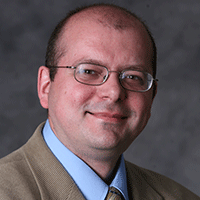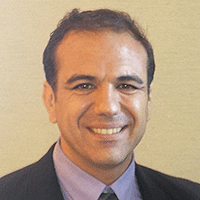Tuesday, July 11 | 9:00am - 10:30am
Abstract: The workshop will review scanning thermal microscopy (SThM) and SThM applications. It will discuss heat transfer mechanisms at the nanoscale, SThM tip-sample heat transfer interactions, spatial resolution and sensitivity for thermal characterization, accurate theoretical models to extract sample temperatures and thermal conductivity, as well as limitations of the technique. The discussion will mainly focus on SThM using resistive and thermocouple type probes, recent developments and commercially available probes, AFM platforms, and calibration methods. The workshop will evaluate available SThM probes and discuss the experimental setups used with emphasis on practical use. Finally, it will discuss various relevant applications in material science, semiconductor, and biology.
Learning outcomes: heat transfer mechanisms at the nanoscale, theoretical models for SThM based thermal conductivity and temperature measurements, SThM probes, evaluation of commercially available SThM systems, experimental SThM setups, SThM applications.
Workshop Leaders

Dr. Theodorian (Theo) Borca-Tasciuc
Mechanical Aerospace and Nuclear Engineering Department
Rensselaer Polytechnic Institute, Troy, NY
Dr. Theodorian (Theo) Borca-Tasciuc has a B.S. in Physics from Bucharest University and a Ph.D. in Mechanical Engineering from UCLA. He started his academic career in 2001 at Rensselaer Polytechnic Institute and since 2013 he is a full professor. He is the director of the Nanoscale Thermophysics and Energy Conversion Laboratory (NanoTEC) on the Rensselaer campus. His research interests include development of advanced metrology techniques for fast, accurate, and high spatial resolution characterization of thermal and thermoelectric properties, fundamental and multiscale investigations of thermal transport and energy conversion particularly in solid-state and development of innovative materials, devices, and systems with applications ranging from sustainable buildings to medical devices. He received the NSF CAREER award, School of Engineering Outstanding Team award, is a member of the ASME’s K8 committee on Fundamentals of Heat Transfer, and a member of the ASME's K-9 committee on Nanoscale Thermal Transport. He organized and chaired multiple symposia and sessions on nanoscale thermal transport and energy conversion with ASME, MRS, and CIMTEC International Conferences.

Dr. Angelo Gaitas
Icahn School of Medicine
Mount Sinai, New York, NY
Dr. Angelo Gaitas is an Assistant Professor at the Icahn School of Medicine at Mt Sinai (ISMMS), where he is currently focused on developing AFM based single cell analysis methods. One of these includes a MEMS thermocouple cantilever with funding from the National Science Foundation (NSF). This innovative device will allow for the direct measurement of temperature variations at the nanoscale, enabling a deeper understanding of the role temperature gradients play in cellular function.
Dr. Gaitas has extensive training in micro- and nano-engineering, physics, and project management in biomedical engineering. He is the leader of a research group that specializes in the development of new devices for single-cell measurements. His educational background includes a Bachelor's degree in Physics and Mathematics, a Master's in Mesoscopic Physics/Nanotechnology, an MBA, and a Ph.D. in Microsystems from Delft.
Prior to joining ISMMS, Dr. Gaitas worked as a Research Associate in Microsystems at the University of Michigan and founded a small business focused on the commercialization of MEMS devices including SThM devices for AFM applications. He has served as a Principal Investigator on several small business research grants from the NSF and NIH, totaling more than $4.5 million. These grants supported the development of thermal microdevices and other MEMS devices with applications in semiconductors, material characterization, and biomedical research.
Dr. Gaitas has invented and developed novel sensors and actuators for temperature and mechanical measurement and microfluidics, including scanning thermal probes for AFM measurements. His scanning thermal probe sensors were successfully commercialized and used in various research and commercial settings. Dr. Gaitas has published 34 peer-reviewed journal papers, many of which focus on SThM, and holds eight issued patents.